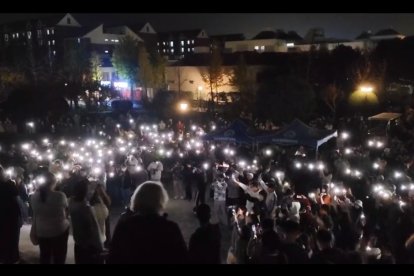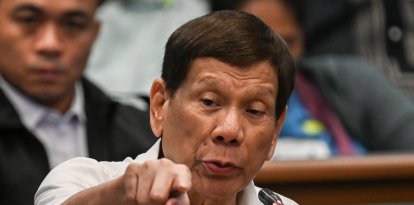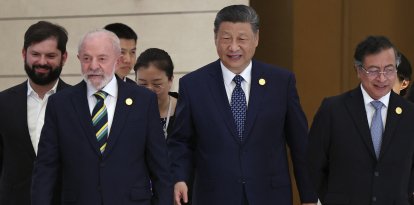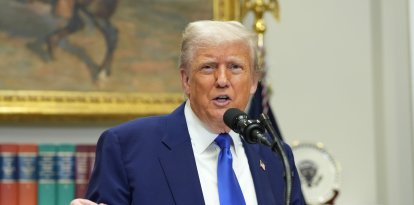Chinese citizens erupt against 'Zero Covid' policy
Thousands of people demonstrated in various cities across the country demanding an end to the confinements and the resignation of President Xi Jinping.

Twitter.
The spark, regrettably and literally speaking, was ignited in Urumqui (Xinjiang), one of the localities that has been under radical confinement for more than 100 days imposed by the Zero Covid policy of the Chinese Communist Party. A fire killed 10 people - three of them children - and citizens have blamed the restrictions for the tragedy, which could have been avoided if government measures had not hindered access to rescue services to extinguish the flames. In response, thousands of citizens took to the streets en masse to protest, even calling for the resignation of the all-powerful Xi Jinping.
"We want freedom"
Chinese citizens have been suffering from Xi's tight restrictions ever since the pandemic began. Despite the economic, psychological and social cost to the affected regions, especially those, such as Shanghai, that have been closed for the longest time, Beijing's policy has not changed one iota. What had been a muted noise for the past few months, with just a few citizens denouncing the situation from anonymity, became over the weekend a historic roar that has filled screens around the world.
Large numbers of citizens in Shanghai, China's most populous city, demonstrated Saturday night and early Sunday, calling for an end to restrictions and chanting "We want freedom!" and "Unblock Xinjiang, unblock all of China!" According to one Dutch correspondent, Eva Rammeloo, based in China on behalf the newspaper Trouw's, a group of those present dared to demand: "Xi Jinping, step down" and "Communist Party, step down." Protests spread to other cities such as Guangzhou and Zhengzhou and among students at universities in Beijing, Xi'an and Nanjing.
Authorities accused the deceased of failing to save themselves
The Washington Post reports that Shanghai authorities, far from even considering that the deaths could have been prevented without the restrictions, noted that "the ability of some residents to rescue themselves was too weak." These statements increased outrage on Chinese social networks and ridicule against Chinese Communist Party officials. It even provoked Urumqi residents, despite the bans and the repression they have been suffering since the confinement was decreed. Many waved the Chinese national flag and called for a total lifting of the closures.
"A game changer?"
After years of censorship and repression, these mass demonstrations have come as a surprise to experts. Especially because they come just a few days after Xi managed to unite personally, the greatest power of a leader in the country's history. Since the rise of the current president of the Chinese Communist Party and the country, the ability of individuals to stand up to the government has been eliminated. Dissidents are in prison, social networks are strictly censored and human rights groups have been banned. The few protests that have occurred were essentially from ruined farmers or small merchants, and they were crushed unceremoniously.
"This is a game-changer," noted Yasheng Huang, a professor at MIT's Sloan School of Management who heads its China Laboratory, in his remarks to The New York Times. "The Zero Covid strategy produced an unintended consequence, which is to put a large number of people in the same situation," he analyzes. He also explains why the outbreak has occurred at this time: "The anger has been suppressed for a while, but I think the 20th Congress (of the Chinese Communist Party) provided an expectation that it would dissipate. When that didn't happen, frustration quickly boiled over."
"A volatile combination."
An idea that is spreading through social networks. This is the case of Dake Jang, an Associated Press journalist in Beijing, for whom the protests seem to indicate "a breaking point". The journalist explains that the death of these 10 people has occurred after months of home confinement and when fears are growing that more populations will denounce their confinement in view of the record increase of Covid cases across the country. "A volatile combination."
For Jang, "The protests are extraordinary because they took place in Xinjiang, one of the most heavily policed places on earth. To my knowledge, there hasn't been a protest of this magnitude in XJ since 2016, possibly since 2009. Mostly Han protesters waved Chinese flags."
BBC journalist detained, beaten and released
However, in a country with the repressive capacity of China, the reaction of the communist authorities was not long in coming. Soon, security forces cordoned off the main rally points and proceeded to make arrests and force those present to erase the graphic material from their cell phones. BBC journalist Ed Lawrence was beaten and arrested and then later released, although, much of this is thanks to international pressure following the station's official statement showing its concern for its worker.
Relaxation of restrictions in Urumqui
Following the protests, Xinjiang authorities announced that they would relax Urumqui, after finding that Covid community broadcasting "has basically been eliminated" in the city. No mention, of course, of the mobilizations.
RECOMMENDATION





















